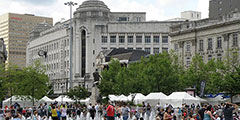Piccadilly Gardens Manchester, M60 1HX
“Everyone has the right to freedom of peaceful assembly.”
– Article 20, UN Declaration of Human Rights
Piccadilly Gardens is a lively public space, a site for performances and markets. It’s also a popular location for public demonstrations, drawing attention to concerns about human rights across the world.
Piccadilly Gardens is now recognised as a place where political issues can be highlighted, and where people can communicate their concerns to fellow citizens and to the media. In recent times, people have gathered to show their support for citizens in places of turmoil, including Syria and Egypt. The passionate but peaceful demonstrations seen in the Gardens reveal Manchester as a city of diverse communities and continuing political and social sensitivity, especially about areas and regimes where citizen safety and human rights are at risk.
Two memorial trees in this area remind us of the human cost of conflict, by remembering civilian casualties of war.
The Tree of Remembrance, a bronze and steel tree, was installed in 2005 as part of a project to value older people. It marked the 60th anniversary of the end of fighting in Europe and remembers civilians who lost their lives in bombing attacks on the city (the ‘Manchester Blitz’) during the Second World War. Their names are engraved on the leaves and trunk.
The Halabja Memorial Tree was planted to remember the people killed and injured by a poison gas attack, in 1988, on the Kurdish city of Halabja in Iraq. This attack by the Iraqi air force during the Iran/Iraq War killed an estimated 5000 people and injured many thousands. People still suffer from the terrible effects of chemicals remaining in the environment. Manchester is home to many Kurdish people who sought refuge from conflict, and is connected to Halabja through the Mayors for Peace initiative – both cities are members.
The deadly aftermath of war prevents citizens from developing cultures of peace around the world, threatening health, education, and freedom – basic human rights. Manchester is home to several agencies that tackle these issues on local and international levels: the Mines Advisory Group, UK Campaign Against Depleted Uranium and the International Campaign to Ban Uranium Weapons work to create safer environments in which people can begin to build peaceful communities.
Refugee Action and RAPAR support people displaced by conflict, who are trying to build lives in Manchester. These agencies all have active bases in the city centre.






 9 minutes
9 minutes